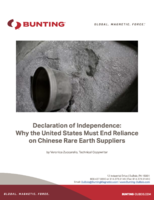ASTM proposes standard on use of infrared thermometers.
Press Release Summary:
ASTM International has proposed ASTM WK21204, Guide for the Selection and Use of Wide-Band, Low Temperature Infrared Thermometers, which is being developed by Subcommittee E20.02 on Radiation Thermometry. According to Frank Liebmann of Fluke Corp., standard is designed to increase basic understanding of infrared thermometers in order to minimize potential for inaccurate measurements. Infrared thermometers are used for noncontact temperature measurement.
Original Press Release:
Proper Use of Infrared Thermometers Will Be Subject of Proposed New ASTM Standard
W. CONSHOHOCKEN, Pa., 9 March 2009 - Providing practical advice on the use of infrared thermometers is the purpose of a proposed new ASTM International standard. Infrared thermometry is used in a variety of measurement applications, including heating, ventilating and air conditioning, building inspection, industrial and manufacturing, automotive and food service equipment.
The proposed new standard, ASTM WK21204, Guide for the Selection and Use of Wide-Band, Low Temperature Infrared Thermometers, is being developed by Subcommittee E20.02 on Radiation Thermometry, part of ASTM International Committee E20 on Temperature Measurement.
According to Frank Liebmann, senior design engineer, Fluke Corp., Hart Scientific Division, and chair of Subcommittee E20.02, ASTM WK21204 will provide a general guide in the use of infrared thermometry. Liebmann says that the proposed standard is designed to increase basic understanding of infrared thermometers in order to minimize the potential for inaccurate measurements.
Infrared thermometers are used for noncontact temperature measurement, which means they do not touch the object whose temperature is being measured. In addition to not having to touch what is being measured, another advantage to IR thermometry is quicker measurements because contact thermometers usually have a longer reaction time due to the thermal mass of their sensors.
All interested parties are invited to participate in the development of ASTM WK21204.
For technical Information, contact: Frank Liebmann, Fluke Corp., Hart Scientific Division, American Fork, Utah (phone: 801-763-1600; frank.liebmann@hartscientific.com). Committee E20 meets May 18-19 at the May committee week in Vancouver, British Columbia, Canada.
ASTM International welcomes and encourages participation in the development of its standards. ASTM's open consensus process, using advanced Internet-based standards development tools, ensures worldwide access for all interested individuals. For more information on becoming an ASTM member, please contact Christine DeJong, ASTM International (phone: 610-832-9736; cdejong@astm.org).
Established in 1898, ASTM International is one of the largest international standards development and delivery systems in the world. ASTM International meets the World Trade Organization (WTO) principles for the development of international standards: coherence, consensus, development dimension, effectiveness, impartiality, openness, relevance and transparency. ASTM standards are accepted and used in research and development, product testing, quality systems and commercial transactions around the globe.




